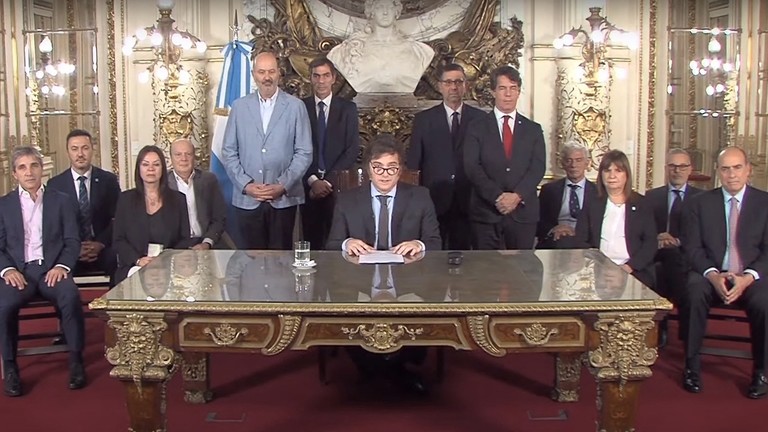
In a groundbreaking effort to address Argentina’s deep-seated economic crisis, President Javier Milei has unveiled an expansive set of economic reforms that signal a departure from traditional economic policies. The sweeping measures encompass not only the privatization of state-owned entities but also the removal of export constraints and the easing of price controls. President Milei, known for his advocacy of anarcho-capitalism, emphasized the urgent need for “economic shock therapy” to bring freedom and autonomy to individuals by dismantling numerous regulations that have long hindered economic growth.
The president’s decree, boasting over 300 initiatives, reflects a comprehensive approach to economic revitalization. Among the initial policy changes outlined are the modernization of labor laws to facilitate job creation, coupled with deregulatory measures affecting pivotal sectors such as tourism, satellite internet services, pharmaceuticals, wine production, and foreign trade.
This announcement comes on the heels of Argentina’s recent economic measures, which include a 54% devaluation of the peso, reductions in energy and transportation subsidies, and a freeze in spending on major state programs. Additionally, plans to increase taxes on grain exports – a critical source of global supply for soybeans, corn, and wheat – have garnered criticism from agriculture groups. These exports play a pivotal role in generating foreign currency reserves, supporting imports, and servicing debts for the country’s central bank.
The economic reforms have sparked both support and opposition, with thousands taking to the streets of Buenos Aires to voice their discontent over austerity measures and advocate for increased support for the vulnerable segments of the population. Argentina, Latin America’s third-largest economy, grapples with a severe economic crisis characterized by annual inflation exceeding 160%, approximately 40% of its population living in poverty, a trade deficit of $43 billion, and $45 billion in debt to the International Monetary Fund with over $10 billion in debt payments due in April 2024. As President Milei embarks on these ambitious reforms, the nation watches with anticipation and uncertainty regarding the potential impact on its economic landscape. The success or failure of these measures could have far-reaching consequences, shaping Argentina’s economic trajectory in the coming years.
In a significant move to address ongoing protests, President Javier Milei’s government in Argentina has announced stringent measures against road closures, a popular form of demonstration in the country known as ‘corte de ruta.’ The president, who is implementing bold economic and political reforms, aims to curb disruptions caused by roadblocks that often accompany protests against his policies.
Minister of Human Capital Sandra Pettovello, in a video message, emphasized the importance of both the right to protest and the freedom of movement within the country. The new regulations target individuals involved in organizing, instigating, or participating in roadblocks, known for bringing vehicular traffic to a standstill. Those found guilty of such actions face the consequence of losing access to the ministry and could risk the termination of their welfare benefits.
President Milei, addressing the protests, noted the paradoxical situation where individuals, in his view, cling to models that have contributed to their impoverishment. He likened this phenomenon to Stockholm syndrome, suggesting that some people express affection and nostalgia for ideologies such as communism, despite their perceived adverse impact on their living conditions.
The government’s stance reflects Milei’s commitment to ensuring the free movement of citizens, particularly in the context of economic reforms aimed at revitalizing Argentina’s struggling economy. The prohibition on road closures seeks to strike a balance between the right to protest and the need for unhindered movement, as the nation grapples with both political and economic challenges. The efficacy of these measures and their impact on the broader protest landscape will likely be closely monitored in the coming days and weeks.
RELATED ARTICLES
- Milei's Argentina Seems to Slowly Recover from Economic Disaster but its too Soon to Tell Yet
- Poverty in Argentina soars to record high despite Milei's Shock Therapy
- Iceland Declares the COVID-19 Pandemic has Ended, All Restrictions Lifted
- Norway Lifts ALL COVID-19 Restrictions, Says 'It Is Time to Return to Normal Daily Life'
- Niki Minaj banned by Twitter, says 'Open your Eyes, Something Evil is Behind This'











